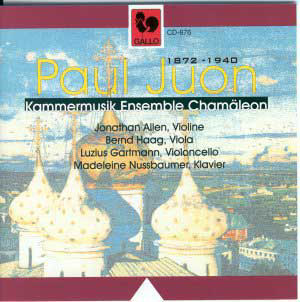Juon was born in Moscow and studied with Taneiev and
Arensky. He taught violin and music theory in Baku, Azerbaijan. In 1905
he moved to Berlin and took up teaching duties there at the Music Academy
where he rose steadily to considerable eminence in German musical life.
Illness forced his resignation in 1934 and he spent his last years in
Vevey in Switzerland.
If Richard Flury favoured Schumann and joyous unpretentiousness,
Juon, on this evidence, favoured earlyish Rachmaninov with works such
as the Cello Sonata, Polichinelle, the Piano Concerto No. 1 and
the Chopin Variations being reference points. The Rhapsodie
No. 1 is highly romanticised in the early manner of his fellow countryman.
At just over half an hour this rhapsody is the most ambitious work on
the CD. Juon is ripely tuneful in this music and can turn on the Dvoøákian
charm as in 4.34 of the sostenuto finale.
The Trio Miniatures are similarly mellow and
romantic almost approaching a Delian afterglow (though Reverie and
Elegie are typically Fauré-like titles) offset by the
jokey Humoreske. Then comes a Viennese Danse Phantastique
recalling, in the intoxication of nostalgia, the ballrooms of Berlin,
Baku and Moscow.
The two pieces for violin and piano are from a set
published as Vier Stücke. The Arioso is Brahmsian
but the Berceuse seems to reach out towards Fauré as also
do the Reverie and Elegie from the Miniatures.
The Romance for viola and piano is a transcription taken from
the op. 7 violin sonata. It, together with the Op. 8 Märchen
(cello and piano), is much in the mood of the Arioso and
is lovingly rounded by both the violist and the cellist respectively.
A little-known scion of Rachmaninov passionately performed
by the Chamäleon Ensemble.
Rob Barnett


